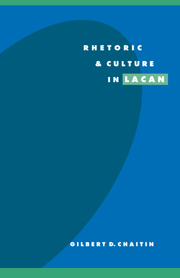Book contents
- Frontmatter
- Contents
- Acknowledgements
- 1 Introduction
- 2 Treeing Lacan, or the Meaning of Metaphor
- 3 A Being of Significance
- 4 From Logic to Ethics: Transference and the Letter
- 5 Desire and Culture: Transference and the Other
- 6 The Subject and the Symbolic Order: Historicity, Mathematics, Poetry
- 7 Conclusion: Lacan and Contemporary Criticism
- Bibliography
- Index
7 - Conclusion: Lacan and Contemporary Criticism
Published online by Cambridge University Press: 04 September 2009
- Frontmatter
- Contents
- Acknowledgements
- 1 Introduction
- 2 Treeing Lacan, or the Meaning of Metaphor
- 3 A Being of Significance
- 4 From Logic to Ethics: Transference and the Letter
- 5 Desire and Culture: Transference and the Other
- 6 The Subject and the Symbolic Order: Historicity, Mathematics, Poetry
- 7 Conclusion: Lacan and Contemporary Criticism
- Bibliography
- Index
Summary
S'y trouvent inscrites [dans ‘L'étourdit’], en forme de nécessaire chicane, les deux articulations logiques déterminant cette aspiration du parlant à se trouver compté ‘homme’ ou ‘femme’ sans que, de la conjonction des termes, puisse se produire rapport sexuel.
La castration, que la psychanalyse a découverte, peut ici se déprendre des mythes qu'il a fallu à Freud pour l'embaumer, au profit de sa raison; on appréciera comment celle-ci, en retour, peut subvertir, d'une logique, les conséquences totalitaires.
‘Liminaire’ to ‘L'étourdit’In the seventies and early eighties Lacan was generally interpreted in the English-speaking world, and especially in American criticism, as a proponent of a formalism, structuralism or poststructuralism which, like the New Criticism, severs the text from the world and proclaims the ethical superiority of the eternal aesthetic over the merely practical, historical or social. He was either praised for exalting the infinite play of the signifier over the imprisoning mastery of establishing meanings, or, on the contrary, chastised for recommending that meaning be fixed in accord with the normative linguistic and social system of a patriarchal order. While these readings are not entirely false, above all they are far from constituting Lacan's truth. Although his thought emerges from the contradictory problematics of romanticism and symbolism, the longing for transcendence in a world without divinity or community and for the valuation of the individual, he begins by demonstrating the impossibility of attaining either one.
- Type
- Chapter
- Information
- Rhetoric and Culture in Lacan , pp. 243 - 253Publisher: Cambridge University PressPrint publication year: 1996

